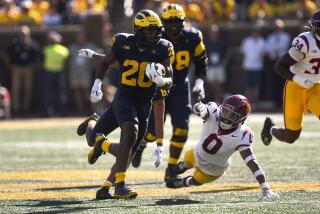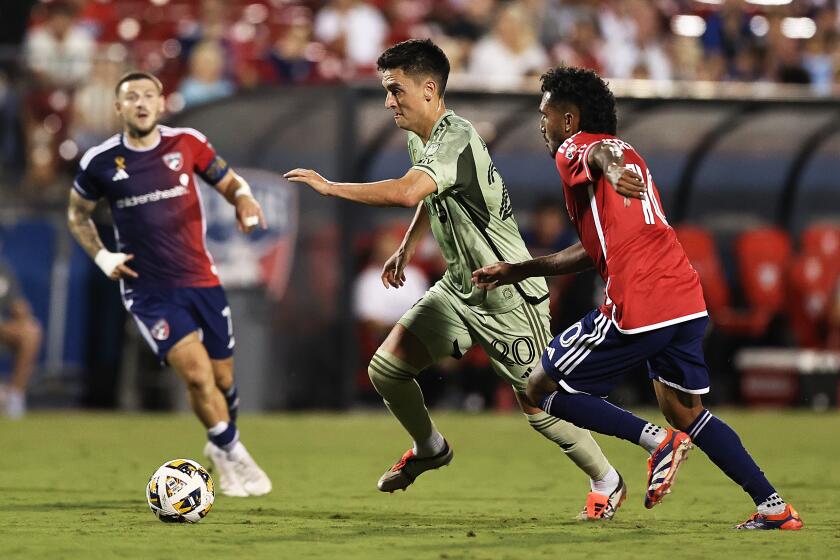BACK IN CIRCULATION
PHOENIX -- The cards and messages that find their way to Tedy Bruschi aren’t the usual fan mail.
“Stories of adversity,” he calls them.
After he had a stroke three years ago -- a football player cut down in his prime -- Bruschi began hearing from people who had suffered the same malady at a young age.
Early on, while he was fighting through rehabilitation, the letters encouraged him.
“It gave me a little bit of hope,” he said this week. “I could come back.”
Now that he has fully recovered, making it all the way back to the NFL, Bruschi is returning the favor.
When he and his New England Patriots teammates take the field against the New York Giants in Super Bowl XLII on Sunday, the linebacker will serve as a nationally televised role model for stroke survivors with whom he has spoken and corresponded.
People like Jeff Rizner, a manufacturing executive in Chicago who remains sluggish on his right side and has learned to write left-handed. Or Robin Lyons, a Massachusetts mom caring for two boys who face years of rehabilitation.
People like Katie Jerdee, a Boston college student who wanted to play soccer again.
“It was frustrating because of your coordination, some things you can’t do,” Jerdee said. “Then you see him.”
About a year ago, Jerdee went running with her Northeastern University team and suddenly veered off course.
“I almost passed out,” she recalled. “I had no idea what was going on.”
A stroke left the 21-year-old student struggling to walk and write. In the months that followed, she came across Bruschi’s book, “Never Give Up,” and discovered that they attended the same rehab center.
“We exchanged war stories,” she recalled. “It was just really interesting . . . we had a lot of the same symptoms and a lot of the same aftereffects.
“Most young people don’t go through this.”
Of the estimated 780,000 Americans who suffer strokes each year, only 1.5% are younger than 34, according to a recent study. But experts insist that people of all ages are at risk.
Bruschi was 31, just home from the 2005 Pro Bowl, when he woke up with numbness and no peripheral vision on his left side. It did not occur to him that he was having a stroke.
“You think of stroke,” he said, “you think of your grandmother.”
Time is of the essence, each hour causing more damage. Bruschi got to a hospital where doctors discovered and repaired a small hole in his heart. Gradually, he began to think about football.
“I don’t think anyone has ever said the words before -- ‘I played professional football again after having a stroke,’ ” he said. “There were times when I was coming back and people told me I shouldn’t. People told me that ‘you’re crazy . . . you’re a husband. You’ve got three children.’ ”
Such doubts struck a chord with Jerdee as she fought to recapture her old life.
“It was a hard time,” she said. “With my stroke, I had to relearn to use my right side.”
Like Bruschi, she was motivated by the goal of returning to athletics. Her mother resisted the idea, but Jerdee got encouragement talking to Bruschi at a meeting for stroke survivors.
“There were a lot of things we could talk about that no one else could understand,” she said. “It’s different than talking to my doctor or talking to my parents.”
Robin Lyons recalls the day her son Paul came home from school and excitedly told her: “Did you know Tedy Bruschi had a stroke?”
By that time, the eight-year-old had already survived two strokes. His three-year-old brother, Michael, had survived three.
Only about 3,000 American children and teenagers have strokes each year, according to one estimate. The Lyons, who live in Walpole, Mass., were facing an even rarer situation.
Paul and Michael, who have two healthy brothers, suffer from moyamoya, a cerebrovascular disorder that affects mostly children.
Young stroke victims tend to recover more quickly and fully, said Dr. David S. Liebeskind, an associate neurology director at the UCLA Stroke Center. Still, the Lyons boys required multiple brain surgeries followed by therapy that will stretch well into the future.
In the middle of all this, Paul heard about Bruschi. He recognized the name because the Lyons are big Patriots fans.
“Wow, he had a stroke and I had a stroke,” Paul told his mother. “Wouldn’t it be cool if he had moyamoya too?”
Robin Lyons explained to her little boy that, no, it would not be cool if Bruschi had the disorder. But she knew what he meant. He felt a little less alone with his medical challenges.
“It gave me hope too,” Robin Lyons said. “If [Bruschi] can get out there on that field and play hard-core football, the outlook is good for my sons.”
Not too much later, she took her boys to see Bruschi. “I think he was more shocked than anything . . . my sons were so young,” she said.
Bruschi smiles when he talks about the Lyons and others he has met.
“To hear people say that I have been an inspiration to them, it’s humbling,” he said. “It’s an honor and it’s something I take very seriously.”
Bruschi’s recovery has been characterized as nothing short of miraculous, but Liebeskind offers a different view.
“He’s not that uncommon,” the UCLA doctor said. “In general, younger stroke victims have a greater chance of recovery.”
The key for survivors of any age is diligence. Bruschi approached rehab the same way he had approached his football career -- with determination and faith.
His coordination and vision gradually returned, and doctors assured him the implant they used to repair his heart could not be shaken loose. Midway through the 2005 season, he rejoined the Patriots.
“It was a progression,” he said. “I had to make my first tackle. Once I made my first tackle, I would consciously get up and say, ‘OK, there’s a tackle.’ ”
After each play ended, he thought of his wife, Heidi, who told him that “if I came back, there is a three-second rule. I can’t be on the ground for more than three seconds.”
Bruschi became a highly visible inspiration to stroke survivors but did not stop there. He wrote his book about recovery and began working with the American Stroke Assn., making appearances and raising money. He sponsored “Tedy’s Team,” a group of stroke survivors who run the Boston Marathon each spring.
That was how Jeff Rizner met him. Rizner had a stroke at 37 and took up running as a means of rehabilitation. Though the right side of his body has not fully recovered, the Chicago-area resident has finished 10 marathons and has run with Tedy’s Team.
“When [Bruschi] talks, he’s very inspirational,” Rizner said. “And watching him on TV, seeing him hit people, I’m like, ‘Go for it.’ ”
Even more, the 44-year-old Rizner appreciates that Bruschi draws attention to their shared affliction.
“You read a lot about heart attacks and about cancer,” he said. “But if you look around, you see very little about strokes.”
Bruschi has helped spread the word about stroke warning signs and the need for immediate medical attention. When he takes the field Sunday, playing in front of millions of television viewers, Liebeskind figures it will be like a running, hitting, tackling public service announcement.
“That kind of image is long overdue,” he said.
Bruschi’s comeback has already enlightened one person about stroke. Back in Boston, when Jerdee felt ready to play soccer again, she knew just how to assuage her worried mother.
She gave her a copy of Bruschi’s book.
--
--
SUPER BOWL XLII
NEW ENGLAND PATRIOTS (18-0) VS.
NEW YORK GIANTS (13-6)
Sunday at Glendale, Ariz., 3:15 p.m. PST, Channel 11
--
(BEGIN TEXT OF INFOBOX)YOUR VIEW: L.A. TIMES
The Times has selected the top 32 Super Bowl winners and seeded them into a tournament. Results from the semifinals (1,690 votes cast):
1989 San Francisco 49ers: 81.8%
d. 1981 San Francisco 49ers: 18.2%
--
1984 San Francisco 49ers: 71%
d. 1976 Oakland Raiders: 29%
More to Read
Go beyond the scoreboard
Get the latest on L.A.'s teams in the daily Sports Report newsletter.
You may occasionally receive promotional content from the Los Angeles Times.











